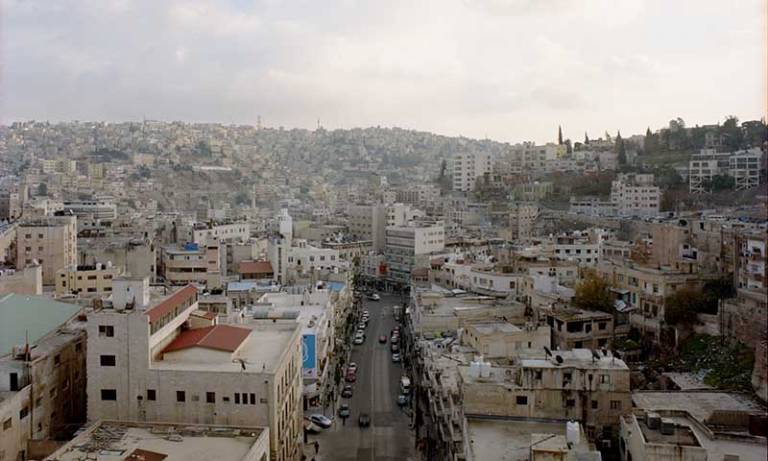27 August - 1 September 2018 in collaboration with Jawad Dukhgan (Studio-X Amman)

Photo by: Antonio Ottomanelli
Water has played an important role in determining the location, growth, and character of cities worldwide. The rapid transformation of urban waterscapes during the past decades led to a range of ecological, economic, political, and social changes. Today more than ever, the future of cities and their inhabitants is dependent on water supplies and infrastructure. Jordan, considered the fourth most water scarce country in the world, faces the threats posed by a crumbling infrastructure, climate change, and groundwater overdraft.
Historically, the city of Amman grew around a natural spring, which has been buried under the city’s road systems over the years. Today’s Amman, where almost half of the country’s population lives and works, relies heavily on centralised, large-scale infrastructure carrying water from long distances, primarily from the finite Disi Aquifer on the border with Saudi Arabia, around 350km from the city. Plans for the Red Sea–Dead Sea Water Conveyance, a proposed large-scale infrastructure that would carry water from the Southern tip of the North along the rift valley to the Dead Sea and Amman have been debated and critiqued for their political, ecological, and economic cost.
The Amman summerLab aims to critically explore how water management and planning in Amman have had important implications for residents’ health, day-to-day life, and sense of community. Participants will visit central and peri-urban areas of the city – with a specific focus on the Zarqa River in Ain Ghazal area – to investigate the impact of formal and informal water provision methods on local communities and their wellbeing.
Through interactions with residents, local stakeholders, scholars, and experts, the workshop will expose the participants to the highly contested and political models of urban water provision, and their implications on health inequality in urban contexts. Ultimately, participants will be asked to devise strategies to tackle the current challenges faced by the city of Amman and its residents to generate new trajectories for water sharing towards equality and urban health.
Click here to download the application form or write to us at dpusummerlab@ucl.ac.uk to express your interest. Further information will be provided in due course. Stay tuned and follow our Facebook page for updates!
Application and fees
The DPU summerLab is open to all students and professionals with an interest in urban environments.
- Fees
- The international participation fee for each workshop is £375 (early-bird discounted rate) or £425 (standard rate). The fee is discounted to £275 (early-bird rate) or £325 for: currently enrolled DPU students (2016-17), DPU alumni, and group applications (5 people or more). Discounted fees apply for participants intending to register to multiple workshops too, please contact us for further info. If you wish to submit a group application (five people or more), please use the ‘group application form’ instead (you can find this below in the ‘Applications’ section). Please note these fees do not include travel or accommodation, though advice and local information will be provided.
- Visas
Participants are responsible for obtaining any visa they might require to which the DPU can provide proof of workshop registration if needed.
- Personal equipment
Participants will need to bring their own laptops and digital equipment. Please ensure that this equipment is covered by your own insurance as the DPU cannot take responsibility for items lost or stolen during the workshop.
- Applications
The deadline for application for the 2018 series will be on Monday 2 July. The deadline for early-bird applicants is on Monday 4 June. The applicant will need to e-mail the form, along with a CV and a letter of motivation to dpusummerlab@ucl.ac.uk
 2018_application_form_individuals.docx
2018_application_form_individuals.docx
 Close
Close

